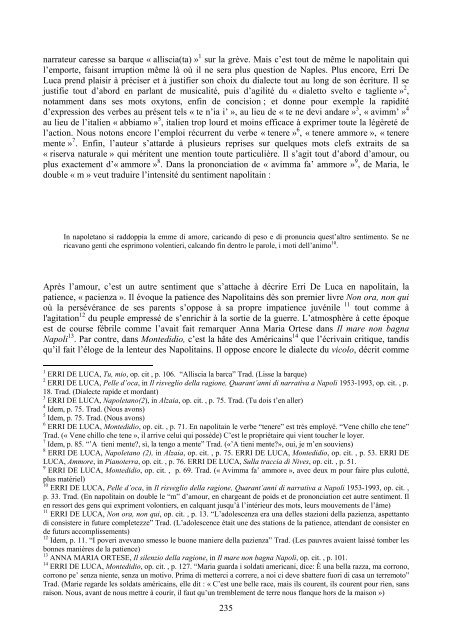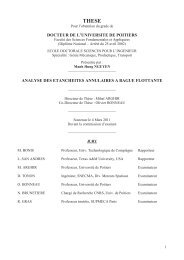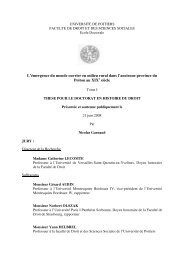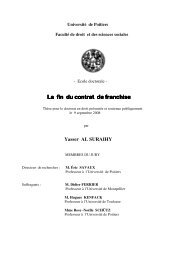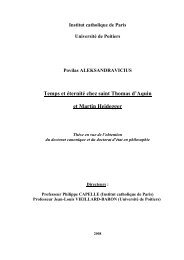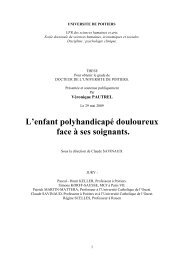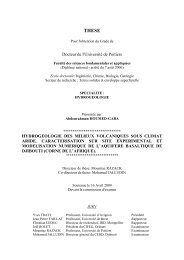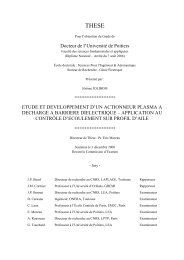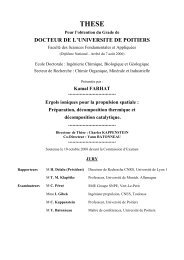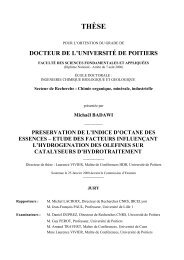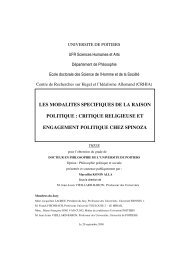Consulter le texte intégral de la thèse - Université de Poitiers
Consulter le texte intégral de la thèse - Université de Poitiers
Consulter le texte intégral de la thèse - Université de Poitiers
Create successful ePaper yourself
Turn your PDF publications into a flip-book with our unique Google optimized e-Paper software.
narrateur caresse sa barque « alliscia(ta) » 1 sur <strong>la</strong> grève. Mais c’est tout <strong>de</strong> même <strong>le</strong> napolitain qui<br />
l’emporte, faisant irruption même là où il ne sera plus question <strong>de</strong> Nap<strong>le</strong>s. Plus encore, Erri De<br />
Luca prend p<strong>la</strong>isir à préciser et à justifier son choix du dia<strong>le</strong>cte tout au long <strong>de</strong> son écriture. Il se<br />
justifie tout d’abord en par<strong>la</strong>nt <strong>de</strong> musicalité, puis d’agilité du « dia<strong>le</strong>tto svelto e tagliente » 2 ,<br />
notamment dans ses mots oxytons, enfin <strong>de</strong> concision ; et donne pour exemp<strong>le</strong> <strong>la</strong> rapidité<br />
d’expression <strong>de</strong>s verbes au présent tels « te n’ia i’ », au lieu <strong>de</strong> « te ne <strong>de</strong>vi andare » 3 , « avimm’ » 4<br />
au lieu <strong>de</strong> l’italien « abbiamo » 5 , italien trop lourd et moins efficace à exprimer toute <strong>la</strong> légèreté <strong>de</strong><br />
l’action. Nous notons encore l’emploi récurrent du verbe « tenere » 6 , « tenere ammore », « tenere<br />
mente » 7 . Enfin, l’auteur s’attar<strong>de</strong> à plusieurs reprises sur quelques mots c<strong>le</strong>fs extraits <strong>de</strong> sa<br />
« riserva natura<strong>le</strong> » qui méritent une mention toute particulière. Il s’agit tout d’abord d’amour, ou<br />
plus exactement d’« ammore » 8 . Dans <strong>la</strong> prononciation <strong>de</strong> « avimma fa’ ammore » 9 , <strong>de</strong> Maria, <strong>le</strong><br />
doub<strong>le</strong> « m » veut traduire l’intensité du sentiment napolitain :<br />
In napo<strong>le</strong>tano si raddoppia <strong>la</strong> emme di amore, caricando di peso e di pronuncia quest’altro sentimento. Se ne<br />
ricavano genti che esprimono vo<strong>le</strong>ntieri, calcando fin <strong>de</strong>ntro <strong>le</strong> paro<strong>le</strong>, i moti <strong>de</strong>ll’animo 10 .<br />
Après l’amour, c’est un autre sentiment que s’attache à décrire Erri De Luca en napolitain, <strong>la</strong><br />
patience, « pacienza ». Il évoque <strong>la</strong> patience <strong>de</strong>s Napolitains dès son premier livre Non ora, non qui<br />
où <strong>la</strong> persévérance <strong>de</strong> ses parents s’oppose à sa propre impatience juvéni<strong>le</strong> 11 tout comme à<br />
l'agitation 12 du peup<strong>le</strong> empressé <strong>de</strong> s’enrichir à <strong>la</strong> sortie <strong>de</strong> <strong>la</strong> guerre. L’atmosphère à cette époque<br />
est <strong>de</strong> course fébri<strong>le</strong> comme l’avait fait remarquer Anna Maria Ortese dans Il mare non bagna<br />
Napoli 13 . Par contre, dans Montedidio, c’est <strong>la</strong> hâte <strong>de</strong>s Américains 14 que l’écrivain critique, tandis<br />
qu’il fait l’éloge <strong>de</strong> <strong>la</strong> <strong>le</strong>nteur <strong>de</strong>s Napolitains. Il oppose encore <strong>le</strong> dia<strong>le</strong>cte du vicolo, décrit comme<br />
1 ERRI DE LUCA, Tu, mio, op. cit , p. 106. “Alliscia <strong>la</strong> barca” Trad. (Lisse <strong>la</strong> barque)<br />
2 ERRI DE LUCA, Pel<strong>le</strong> d’oca, in Il risveglio <strong>de</strong>l<strong>la</strong> ragione, Quarant’anni di narrativa a Napoli 1953-1993, op. cit. , p.<br />
18. Trad. (Dia<strong>le</strong>cte rapi<strong>de</strong> et mordant)<br />
3 ERRI DE LUCA, Napo<strong>le</strong>tano(2), in Alzaia, op. cit. , p. 75. Trad. (Tu dois t’en al<strong>le</strong>r)<br />
4 I<strong>de</strong>m, p. 75. Trad. (Nous avons)<br />
5 I<strong>de</strong>m, p. 75. Trad. (Nous avons)<br />
6 ERRI DE LUCA, Montedidio, op. cit. , p. 71. En napolitain <strong>le</strong> verbe “tenere” est très employé. “Vene chillo che tene”<br />
Trad. (« Vene chillo che tene », il arrive celui qui possè<strong>de</strong>) C’est <strong>le</strong> propriétaire qui vient toucher <strong>le</strong> loyer.<br />
7 I<strong>de</strong>m, p. 85. “’A tieni mente?, sì, <strong>la</strong> tengo a mente” Trad. («’A tieni mente?», oui, je m’en souviens)<br />
8 ERRI DE LUCA, Napo<strong>le</strong>tano (2), in Alzaia, op. cit. , p. 75. ERRI DE LUCA, Montedidio, op. cit. , p. 53. ERRI DE<br />
LUCA, Ammore, in Pianoterra, op. cit. , p. 76. ERRI DE LUCA, Sul<strong>la</strong> traccia di Nives, op. cit. , p. 51.<br />
9 ERRI DE LUCA, Montedidio, op. cit. , p. 69. Trad. (« Avimma fa’ ammore », avec <strong>de</strong>ux m pour faire plus culotté,<br />
plus matériel)<br />
10 ERRI DE LUCA, Pel<strong>le</strong> d’oca, in Il risveglio <strong>de</strong>l<strong>la</strong> ragione, Quarant’anni di narrativa a Napoli 1953-1993, op. cit. ,<br />
p. 33. Trad. (En napolitain on doub<strong>le</strong> <strong>le</strong> “m” d’amour, en chargeant <strong>de</strong> poids et <strong>de</strong> prononciation cet autre sentiment. Il<br />
en ressort <strong>de</strong>s gens qui expriment volontiers, en calquant jusqu’à l’intérieur <strong>de</strong>s mots, <strong>le</strong>urs mouvements <strong>de</strong> l’âme)<br />
11 ERRI DE LUCA, Non ora, non qui, op. cit. , p. 13. “L’ado<strong>le</strong>scenza era una <strong>de</strong>l<strong>le</strong>s stazioni <strong>de</strong>l<strong>la</strong> pazienza, aspettanto<br />
di consistere in future comp<strong>le</strong>tezze” Trad. (L’ado<strong>le</strong>scence était une <strong>de</strong>s stations <strong>de</strong> <strong>la</strong> patience, attendant <strong>de</strong> consister en<br />
<strong>de</strong> futurs accomplissements)<br />
12 I<strong>de</strong>m, p. 11. “I poveri avevano smesso <strong>le</strong> buone maniere <strong>de</strong>l<strong>la</strong> pazienza” Trad. (Les pauvres avaient <strong>la</strong>issé tomber <strong>le</strong>s<br />
bonnes manières <strong>de</strong> <strong>la</strong> patience)<br />
13 ANNA MARIA ORTESE, Il si<strong>le</strong>nzio <strong>de</strong>l<strong>la</strong> ragione, in Il mare non bagna Napoli, op. cit. , p. 101.<br />
14 ERRI DE LUCA, Montedidio, op. cit. , p. 127. “Maria guarda i soldati americani, dice: È una bel<strong>la</strong> razza, ma corrono,<br />
corrono pe’ senza niente, senza un motivo. Prima di metterci a correre, a noi ci <strong>de</strong>ve sbattere fuori di casa un terremoto”<br />
Trad. (Marie regar<strong>de</strong> <strong>le</strong>s soldats américains, el<strong>le</strong> dit : « C’est une bel<strong>le</strong> race, mais ils courent, ils courent pour rien, sans<br />
raison. Nous, avant <strong>de</strong> nous mettre à courir, il faut qu’un tremb<strong>le</strong>ment <strong>de</strong> terre nous f<strong>la</strong>nque hors <strong>de</strong> <strong>la</strong> maison »)<br />
235


